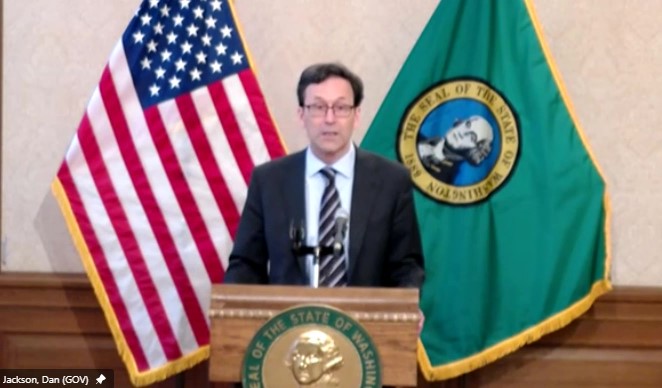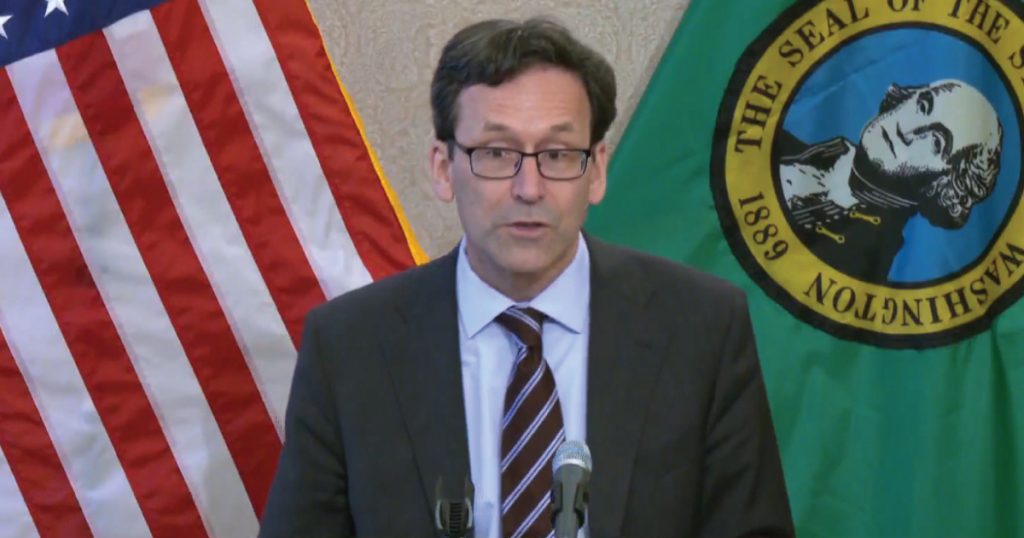OLYMPIA—Washington State Governor Bob Ferguson said he will not be signing off on either House or Senate 2025-27 operating budget proposals during a press conference Tuesday, April 1, explaining he cannot stand by the tax hikes proposed, especially during a time of federal uncertainty. [Watch video of Ferguson budget presser at end of article].

“Hope is not a strategy with Donald Trump,” said Ferguson. “Take my word on that. I’m not going to allow the state that I love to be at the financial mercy of Donald Trump and Elon Musk.”
Ferguson said the state’s financial situation is challenging but it cannot be made weaker by not making smart choices. He pledged to authorize a budget that has no budget gimmicks, and no unrealistic revenue assumptions, all the while preserving Washington’s reserves and rainy-day funds, preparing for more cuts from the federal government, and preserving the state’s AAA bond rating.
The Washington State House passed its two-year, $77.8 billion operating budget a little after midnight, Tuesday morning, April 1, with a vote of 54-44. Every Republican, and even five Democrats, made up the opposing votes.
The Senate passed its own budget three days earlier with a 28-21 vote. That budget includes $6.5 billion in cuts and $16 billion in new revenue over the next four years by raising property taxes and enforcing a wealth tax.
Gov. Ferguson said a wealth tax is a “novel, untested, [and] difficult to implement,” idea that could likely be challenged in court.
“If the legislature wishes to complete our work on time, they need to immediately move the budget discussions in a significantly different direction on both of these issues,” said Ferguson.
A month ago, Gov. Ferguson held a press conference announcing a plan that could slash the state’s $15 billion shortfall in half. However, since then, an updated revenue forecast has added an additional $1 billion to that deficit driving up the total to $16 billion.
The state’s shortfall has only been exacerbated, Ferguson says, by the Trump administration’s unprecedented spending cuts which includes cutting hospital staff, elimination of public health funds, and food assistance programs being reduced.
“We need to accept the reality that we are in the midst of unprecedented times with a federal government that is intent on making significant cuts, no matter the resulting harm to Americans,” said Ferguson. “This is a five-alarm fire, and I intend to treat it that way.”
The Governor said an all-cuts budget is out of the question because it would result in cutting core services, but, at the same time, the state cannot adopt a budget that falls anywhere near the level of taxes currently proposed by the House and Senate.
“We must take a balanced approach that prepares our state for an extremely challenging situation with the federal government and our economy,” said Gov. Ferguson.
Ferguson’s priorities were made clear as he continues to work with lawmakers on a final budget. Those priorities include protecting the state’s rainy day fund (otherwise known as the Budget Stabilization Account), basing a budget off of “realistic revenue projects” instead of the 4.5% allowed by law, minimizing new investments, including billions in efficiencies and savings in order to preserve services like public safety and K through 12 education, and lastly not relying on revenue streams that could be overturned by courts.
Washington State’s current budget is approximately $72 billion, which is about double what it was a decade ago. Governor Ferguson emphasized this point to hammer in that the state is not in a recession and the budget will continue to grow.
The Governor wasn’t all critical of the Senate and House budget proposals, however. He applauded their implementation of his proposed budget cuts made back in March, as well as factoring in the $3 billion worth of cuts proposed by his predecessor, Jay Inslee.
He also complemented both chambers’ target investments which include proposals on the response to overcrowding and juvenile rehabilitation.
“We have a real crisis right now and I’m working in a bipartisan way to address it. That said, we need to avoid over committing on new investments,” said Ferguson. “Given our budget realities, this is not the time for major investments in any program, no matter how worthwhile. When you’ve got a $16 billion budget shortfall, you’ve got to stop digging.”
Ferguson continued that there are no guarantees that federal funding will continue, given the recent cancellation of $160 million in public health funding, which makes up more than 200 state jobs – including epidemiologists and workers providing vaccines. These cuts make it harder, Ferguson said, to administer mental health care, substance abuse treatment, assistance applying for housing, food, and medical benefits, as well as being able to address disease outbreaks.
Approximately 28% of Washington State’s budget relies on federal funding, or about $43 billion per biennium. Federal dollars form the backbone of several statewide institutions including Medicaid ($34 billion – 60% of the state’s entire Medicaid budget), education ($2.5 billion), child welfare and early learning ($1 billion), disaster recovery and response ($600 million), unemployment insurance ($304 million), and temporary assistance for needy families ($864 million).
“We cannot predict with certainty what is going to happen with our federal funding, but we can be sure there will be chaos and more cuts to come with little or no warning,” said Ferguson. “In other words, our budget situation is grim, but it may soon become dire. Those storm clouds are not on the horizon. They are on top of us right now.”
To prepare for the worst, Ferguson placed emphasis on maintaining the state’s reserves.
Washington State is one of just four states in the nation that has reserves at 10% or less of its annual budget. These reserves help protect the state from economic instability, natural disasters (with Washington being the fourth disaster prone state in the nation), and would help protect the state from any further federal government cuts.
Draining those reserves could also weaken Washington’s AAA bond rating which Gov. Ferguson said is “critical we maintain that.”
The state’s bond rating opens it up to more projects at lower costs, he added, which opens capacity in state transportation and capital budgets to build more schools, fund more environmental cleanup projects, and the ability to replace aging infrastructure.
Gov. Ferguson further mentioned that it is particularly important to live within its means considering President Trump’s implemented tariffs, which he said could adversely impact the state’s economy.
Washington is one of the most trade-dependent states in the nation. In 2024, it ranked ninth in exported goods, shipping $58 billion worth of goods around the world. Nearly all the country’s exports and imports flowed through Washington state ports last year.
What’s more, approximately 40% of the state’s jobs are tied to trade. Washington’s agricultural exports totaled $7.5 billion in 2023 with Canada being Washington’s number one export market for agricultural goods, and Mexico ranking fourth.
Ferguson hammered in these points to support his notion that Washington State must be prepared for if these tariffs were to lead to a trade war.
The law allows the state to assume 4.5% growth when calculating its revenue forecast but Ferguson says that doesn’t mean the state has to spend that much.
“Any budget I sign must spend, only based on what our economic experts forecast our growth will be. Washington families must budget to the actual salaries of their family members. The state of Washington, as long as I’m governor, will do exactly that,” said Ferguson.
While dismissing the Senate and House proposed wealth tax, citing it could be challenged in court for being found unconstitutional, Gov. Ferguson did stand by the capital gains tax as a means to steer away from Washington’s regressive tax structure – being the second most regressive tax structure in the country.
🚨BREAKING: GOVERNOR FERGUSON LAYS OUT HIS CASE FOR NOT ALLOWING WA STATE “TO BE AT THE FINANCIAL MERCY OF DONALD TRUMP AND ELON MUSK”
Governor Bob Ferguson held a press conference today on why he cannot support “as is” neither the House’s $77.8 billion nor Senate’s $78.5… pic.twitter.com/jHBfVQFkml— Lynnwood Times (@LynnwoodTimes) April 1, 2025

Author: Kienan Briscoe












